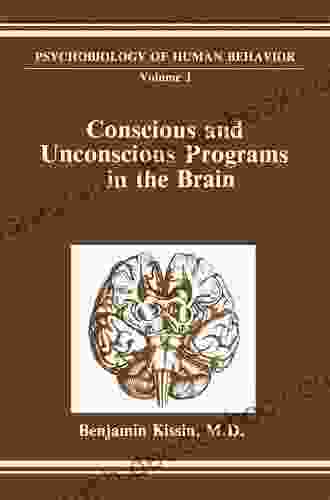Conscious and Unconscious Programs in the Brain: Perspectives in Social

4 out of 5
| Language | : | English |
| File size | : | 6926 KB |
| Text-to-Speech | : | Enabled |
| Enhanced typesetting | : | Enabled |
| X-Ray for textbooks | : | Enabled |
| Word Wise | : | Enabled |
| Print length | : | 406 pages |
| Screen Reader | : | Supported |
The human brain is a complex and fascinating organ, responsible for a vast array of cognitive functions, emotions, and behaviors. Among its many intricate processes, the brain operates on both conscious and unconscious levels, each playing a vital role in our daily lives and social interactions.
Conscious programs refer to the thoughts, feelings, and actions that we are aware of and can consciously control. These programs include our explicit memories, deliberate decisions, and intentional behaviors. Conscious programs are essential for navigating our environment, making decisions, and interacting with others in a rational and logical manner.
Unconscious programs, on the other hand, operate outside of our conscious awareness. They include implicit memories, automatic behaviors, and subconscious beliefs that influence our thoughts, emotions, and behaviors without us realizing it. Unconscious programs are largely shaped by our past experiences, cultural norms, and social conditioning.
While both conscious and unconscious programs are crucial for human functioning, they can sometimes come into conflict with each other. For example, we may consciously intend to be polite and respectful in a social situation, but our unconscious biases may lead us to behave in a way that contradicts our intentions.
Understanding the interplay between conscious and unconscious programs is essential for gaining a deeper understanding of human behavior, particularly in the context of social interactions. Here are some key perspectives on the role of these programs in social cognition and behavior:
- Implicit biases: Unconscious programs can give rise to implicit biases, which are automatic and often negative attitudes or stereotypes that we hold about certain groups of people. These biases can influence our perceptions, judgments, and behaviors towards others, even if we consciously disapprove of them.
- Social priming: Unconscious programs can be activated by external cues or triggers in our environment. This process, known as social priming, can influence our thoughts, feelings, and behaviors in ways that we are not aware of. For example, being exposed to images of violence can prime us to be more aggressive, even if we do not consciously intend to be.
- Nonverbal communication: Unconscious programs play a significant role in nonverbal communication. Our body language, facial expressions, and tone of voice can convey important messages to others, even if we are not consciously aware of sending them. These nonverbal cues can influence how others perceive us and interact with us.
Given the profound influence of unconscious programs on our social interactions, it is important to cultivate self-awareness and understand how these programs may be shaping our thoughts, emotions, and behaviors. Here are some strategies for harnessing the power of the unconscious mind and enhancing our social interactions:
- Mindfulness: Practicing mindfulness techniques can help us become more aware of our thoughts, feelings, and behaviors, including those that are operating at an unconscious level. This increased awareness can help us identify and challenge our implicit biases and make more informed choices.
- Self-reflection: Engaging in regular self-reflection can help us understand the motivations and beliefs that underlie our actions. By reflecting on our past experiences and social interactions, we can gain insights into our unconscious programs and how they may be affecting our relationships.
- Social perspective-taking: Making an effort to understand the perspectives and experiences of others can help us overcome our implicit biases and build more inclusive and equitable relationships. By actively listening to others and seeking out diverse perspectives, we can expand our understanding of the world and challenge our unconscious assumptions.
By understanding and harnessing the power of both conscious and unconscious programs in the brain, we can gain a deeper understanding of ourselves and our social interactions. This knowledge can empower us to make more informed choices, build stronger relationships, and create a more just and equitable society.
4 out of 5
| Language | : | English |
| File size | : | 6926 KB |
| Text-to-Speech | : | Enabled |
| Enhanced typesetting | : | Enabled |
| X-Ray for textbooks | : | Enabled |
| Word Wise | : | Enabled |
| Print length | : | 406 pages |
| Screen Reader | : | Supported |
Do you want to contribute by writing guest posts on this blog?
Please contact us and send us a resume of previous articles that you have written.
 Novel
Novel Page
Page Genre
Genre Reader
Reader Library
Library E-book
E-book Magazine
Magazine Newspaper
Newspaper Paragraph
Paragraph Sentence
Sentence Shelf
Shelf Bibliography
Bibliography Preface
Preface Synopsis
Synopsis Footnote
Footnote Manuscript
Manuscript Codex
Codex Library card
Library card Narrative
Narrative Biography
Biography Memoir
Memoir Encyclopedia
Encyclopedia Dictionary
Dictionary Thesaurus
Thesaurus Character
Character Resolution
Resolution Librarian
Librarian Borrowing
Borrowing Stacks
Stacks Archives
Archives Periodicals
Periodicals Academic
Academic Journals
Journals Reading Room
Reading Room Rare Books
Rare Books Interlibrary
Interlibrary Study Group
Study Group Dissertation
Dissertation Theory
Theory Textbooks
Textbooks Edythe J Greene
Edythe J Greene Marci Shimoff
Marci Shimoff Carline Anglade Cole
Carline Anglade Cole Dante Mena
Dante Mena Arnold Wesker
Arnold Wesker David Dominguez
David Dominguez Allan Ford
Allan Ford Mark Elder
Mark Elder Dandi Palmer
Dandi Palmer Steve Ashton
Steve Ashton B Rain Bennett
B Rain Bennett John W Dean
John W Dean Ralph Burton
Ralph Burton Edward C Chang
Edward C Chang Calvin Crowther
Calvin Crowther Hindol Sengupta
Hindol Sengupta Roger Smith
Roger Smith Jupiter Rueda De Leon
Jupiter Rueda De Leon David Brunori
David Brunori Lyla Bashan
Lyla Bashan
Light bulbAdvertise smarter! Our strategic ad space ensures maximum exposure. Reserve your spot today!
 Chadwick PowellFollow ·16k
Chadwick PowellFollow ·16k Benjamin StoneFollow ·15.7k
Benjamin StoneFollow ·15.7k Clark BellFollow ·15.7k
Clark BellFollow ·15.7k Mason PowellFollow ·17.3k
Mason PowellFollow ·17.3k Edward ReedFollow ·11.9k
Edward ReedFollow ·11.9k David MitchellFollow ·5.4k
David MitchellFollow ·5.4k Robin PowellFollow ·8.3k
Robin PowellFollow ·8.3k George MartinFollow ·7.8k
George MartinFollow ·7.8k

 Ricky Bell
Ricky BellThe Marriage: An Absolutely Jaw-Dropping Psychological...
In the realm of...

 Ray Blair
Ray BlairDiscover the Enchanting Charm of Budapest and Its...
Nestled in the heart of...

 Tyrone Powell
Tyrone PowellHuddle: How Women Unlock Their Collective Power
Huddle is a global movement that empowers...

 Grayson Bell
Grayson BellThe Coin Story of the Holocaust: A Symbol of Hope and...
In the depths of the...

 Virginia Woolf
Virginia WoolfFolklore Performance and Identity in Cuzco, Peru: A...
Nestled amidst...

 Dylan Mitchell
Dylan MitchellThe Enduring Love Story of Héloïse and Abélard: A Tale of...
An Intellectual Passion In the heart of...
4 out of 5
| Language | : | English |
| File size | : | 6926 KB |
| Text-to-Speech | : | Enabled |
| Enhanced typesetting | : | Enabled |
| X-Ray for textbooks | : | Enabled |
| Word Wise | : | Enabled |
| Print length | : | 406 pages |
| Screen Reader | : | Supported |











